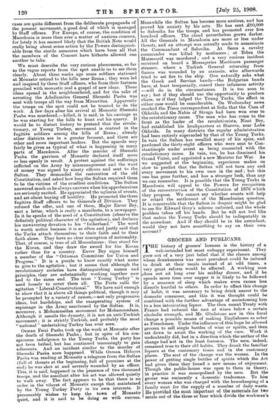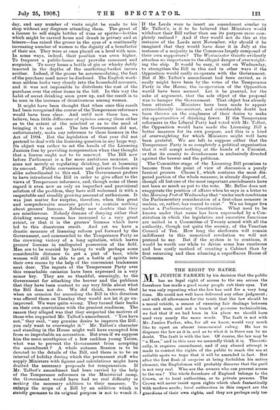GROCERS AND PUBLICANS. T HE history of grocers' licenses is the
history of a well-intended but most unhappy experiment. They grew out of a very just belief that if the classes among whom drunkenness was most prevalent could be induced to drink at their meals instead of at odd times, a very great reform would be effected. A working man .does not sit long over his midday dinner, and if he spends more time over supper it is likely to be followed by a measure of sleep which makes even excess less directly hurtful to others. In order to effect this change of habit, it was necessary to bring drink nearer to the domestic consumer, and this it was thought could be combined with the further advantage of accustoming him to a less intoxicating liquor. The then recent Treaty with France had reduced the cost of wines below a certain alcoholic strength, and Mr. Gladstone saw in this fiscal change a possible means of making Englishmen as sober as Frenchmen. "Under the influence of. this hope he, allowed grocers to sell single bottles of wine or spirits, and then sat down to await the working of the cure. Work it undoubtedly did, but in a direction which the author of the change had not in the least foreseen. The men, indeed, remained true to their old habits. They drank the familiar liquors at the customary times and in the customary places. The seat of the change was the women. In the power of getting single bottles of spirits which the Act had given them they found a new means of enjoyment. Though the public-house was open to them, in theory, in practice it was monopolised by the men. But the grocer was eminently a domestic tradesman. To him every woman who was charged with the housekeeping of a family went for the supply of a number, of daily wants. He provided, the most important of the materials for two meals out of the three or four which divide the workman's
day, and any number of visits might be made to his shop without any disgrace attending them. The grant of a license to sell single bottles of wine or spirits—bottles which might be carried home and drunk in privacy and at leisure—has raised the grocer in the eyes of a continually increasing number of women to the dignity of a benefactor of their sex. They were at once placed on a level with men. In some ways, indeed, their position was even higher. To frequent a public-house may provoke comment and suspicion. To carry home a bottle of gin or whisky deftly inserted in the depths of the marketing-basket incurs neither. Indeed, if the grocer be accommodating, the fact of the purchase need never be disclosed. The English work- man seldom looks very closely into the household accounts, and it was not impossible to distribute the cost of the purchase over the other items in the bill. In this way the habit of secret drinking soon grew up, and the result is to be seen in the increase of drunkenness among women.
It might have been thought that when once this result had been recognised the course of the Temperance reformers would have been clear. And until now there has, we believe, been little difference of opinion among them either as to the extent of the mischief or as to the need of bringing it to an end. The late Government did not, unfortunately, make any reference to these licenses in the Act of 1904. But the legislation of that year did not pretend to deal with the licensing question in any large way. Its object was rather to set the hands of the Licensine.
Justices free by providing compensation when they thoughtthat a license ought not to be renewed. The -Bill now before Parliament is a far more ambitious measure. It aims not merely at regulating drinking, but at lessening its amount. Public convenience and private freedom are alike subordinated to this end. The Government profess to have introduced the Bill in order to give effect to the views of Temperance reformers, and, though some of these regard it even now as only an imperfect and provisional solution of the problem, they have still welcomed it with a, respectable and steadily growing amount of enthusiasm. It was just matter for surprise, therefore, when this great and comprehensive measure proved to contain nothing about grocers' licenses. Nobody now doubts that they are mischievous. Nobody dreams of denying either that drinking among women has increased to a very great extent, or that it is the grocers' licenses which have led to this disastrous result. And yet we have a drastic measure of licensing reform put forward by the Government, and commended to the Temperance Party as the crowning victory of a long agitation, which leaves grocers' licenses in undisputed possession of the field. Men are to be worried by having to walk perhaps some considerable distance to get a pint of beer, while women will still be able to get a bottle of spirits into their own rooms by the help of the convenient tradesman next door. The regrets of the Temperance Party over this remarkable omission have been expressed in a very minor key. They are so thankful, seemingly, to the Government for attacking the brewer and the publican that they have been content to say very little about what the Bill does not do. We did think, however, that when an occasion for amending the Bill in this direction was offered them on Tuesday they would not let it go un- improved. We were quite wrong. They turned their backs on their own convictions with the greatest readiness. The reason they alleged was that they suspected the motives of those who supported Mr. Talbot's amendment. "You have not," they said, "any genuine desire to improve the Bill ; you only want to overweight it." Mr. Talbot's character and standing in the House might well have exempted him from so improbable an accusation. But even if we suppose him the mere mouthpiece of a few reckless young Tories, what was to prevent the Government from accepting the amendment ? A whole autumn Session is to be devoted to the details of the Bill, and there is to be an interval of holiday during which the permanent staff who supply Ministers with figures and calculations might have drafted the necessary proposals for compensation. If Mr. Talbot's amendment had been carried by the help of the Temperance reformers in the Ministerial camp, the Government would have had no real difficulty in making the necessary addition to their measure. To enlarge the scope of a Bill by an addition which is strictly germane to its original purpose is not to wreck it. If the Lords were to insert an amendment similar to Mr. Talbot's, is it to be believed that Ministers would withdraw their Bill rather than see its purpose more com- pletely realised ? And if they would not do this at the instauce of the Lords next November, why should it be imagined that they would have done it in July at the instance of a majority in the Commons largely composed of their own supporters ? The Westminster Gazette evidently attaches no importance to the alleged danger of overweight- ing the ship. It would be easy, it said on Wednesday, to strengthen the Bill in this and in other ways if the Opposition would really co-operate with the Government. But if Mr. Talbot's amendment had been carried, as it easily might have been by the votes of the Temperance Party in the House, the co-operation of the Opposition would have been secured. Let it be granted, for the sake of argument, that the sole object of the proposal was to hamper the Government. That object has already been attained. Ministers have been made to . appear extraordinarily inconsistent, and considerable doubt has been thrown on the singleness of their desire to make the opportunities of drinking fewer. If the Temperance reformers in the Liberal Party had voted with Mr. Talbot, the Opposition would have made the Licensing Bill a better measure for its own purpose, and this is a kind of overweighting for which Ministers might well have been grateful. We are left to suppose either that the Temperance Party is so completely a political organisatiou that it will accept nothing at the hands of a Unionist, or that its enmity to drunkenness is exclusively directed against the brewer and the publican.
The Committee stage of the Licensing Bill promises to become from the point of view of discussion a purely farcical process. Clause I., which contains the most dis- puted portion of the whole measure, is already disposed of, though all but one of the most important ainendments have not been so much as put to the vote. Mr. Belloc does not exaggerate the position of affairs when he says in a letter to the Morning Post of Wednesday that "under such conditions the Parliamentary consideration of a first-class measure is useless, or, rather, has ceased to exist." We no longer live under a Parliamentary Constitution. What used to be known under that name has been superseded by a Con- stitution in which the legislative and executive functions are united in a Committee of Twenty armed with all the authority, though. not quite the secrecy, of the Venetian Council of Ten. How long the electorate will remain indifferent to this unnoticed revolution we will not pretend to say. But if the system is to continue, it would be worth our while to devise some less cumbrous and less costly method of Creating a Cabinet than by first returning and then silencing a superfluous House of Commons.







































 Previous page
Previous page